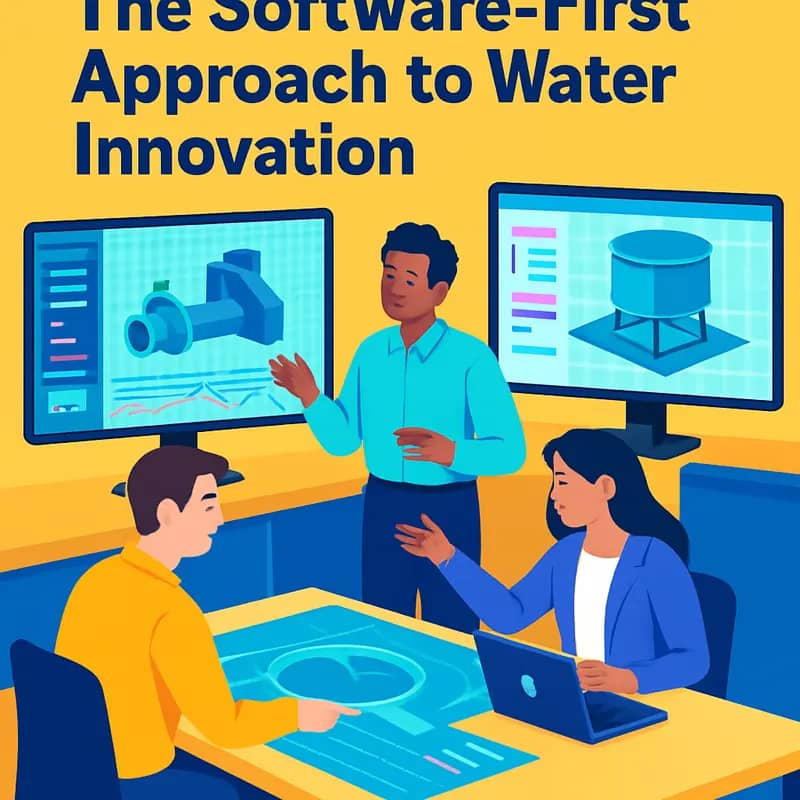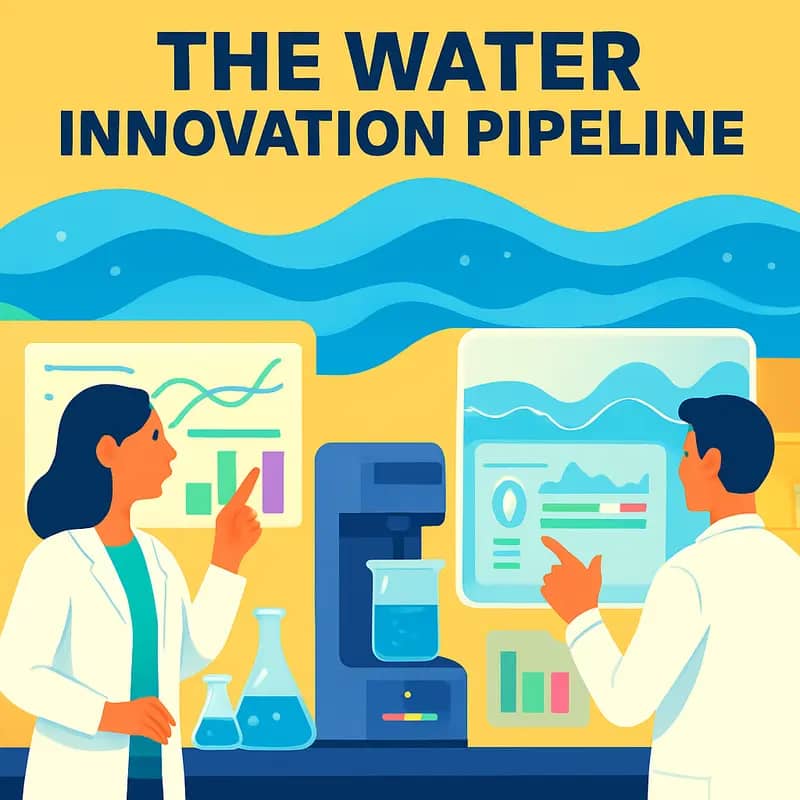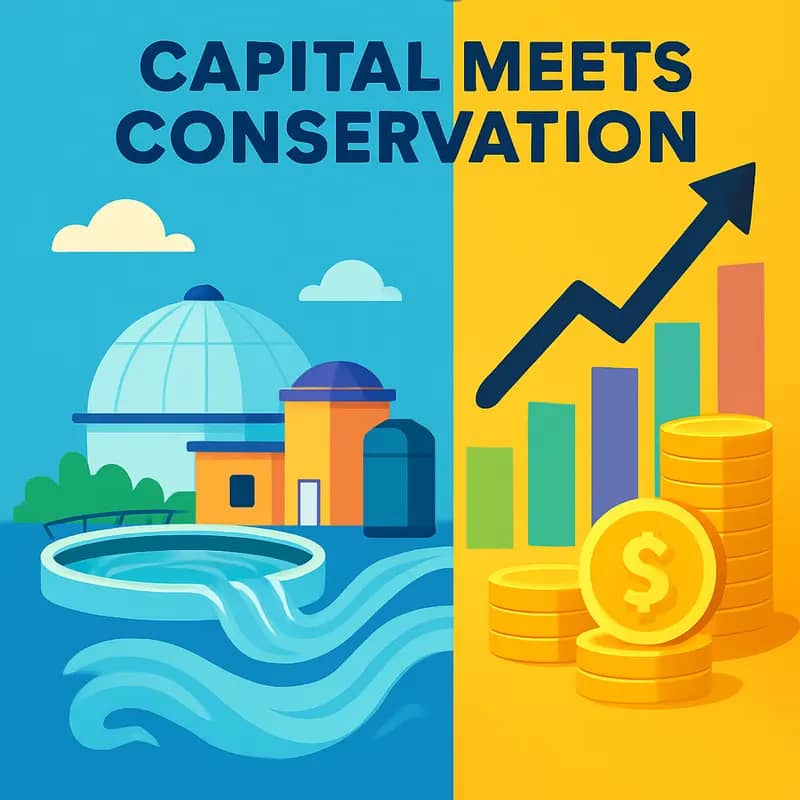At the intersection of water infrastructure and cutting-edge software lies an investment thesis that could revolutionize how we design, build and operate our water systems. Aspen Capital Group, with $2.2 billion in assets under management, has positioned itself as a key player in this space by taking calculated bets on companies that leverage software to solve complex water challenges. Their approach combines traditional growth equity principles with a laser focus on vertical market software companies that are reimagining water infrastructure engineering and operations. This strategy not only promises attractive returns but also addresses critical challenges in water sustainability and infrastructure modernization.
Aspen Capital Group is part of my Ultimate Water Investor Database, check it out!
Investor Name: Aspen Capital Group
Investor Type: PE
Latest Fund Size: $2200 Million
Dry Powder Available: Yes
Typical Ticket Size: $3M – $10M
Investment Themes: Sustainable Water Infrastructure Design, Digital automation for engineering, Broader innovation enablement
Investment History: $5833333.33 spent over 2 deals
Often Invests Along: HG Ventures
Already Invested In: Transcend Software Inc.
Leads or Follows: Lead
Board Seat Appetite: High
Key People: Steve Jones, John Gordy, John Haesler
The Software-First Approach to Water Innovation

Aspen Capital Group has positioned itself at the intersection of traditional water infrastructure and cutting-edge software innovation through a distinctive investment approach that prioritizes digital transformation. The firm’s strategy centers on identifying and nurturing growth-stage companies developing software solutions that fundamentally reimagine how water infrastructure is designed, operated, and maintained.
With investment tickets ranging from $5 million to $20 million, Aspen targets companies that have proven their core technology and achieved initial market validation. Their portfolio focuses on software platforms that address critical infrastructure challenges – from automated engineering design tools to artificial intelligence-powered operations optimization systems.
The firm’s investment thesis rests on the understanding that software can dramatically accelerate the modernization of water infrastructure while reducing costs. Traditional infrastructure engineering often relies on manual processes, rules of thumb, and overdesign to manage uncertainty. Modern software tools enable engineers to rapidly iterate through design options, optimize for multiple variables simultaneously, and leverage data analytics to make more informed decisions.
This software-first mindset represents a paradigm shift in how water infrastructure projects are conceived and executed. Rather than viewing software as an add-on to physical infrastructure, Aspen’s portfolio companies develop digital solutions that fundamentally reshape engineering workflows and asset management approaches. The result is infrastructure that is not only more efficient to design and operate but also more resilient and adaptable to changing conditions.
By focusing on the $5-20M growth stage, Aspen provides capital at a critical inflection point when software companies are ready to scale their solutions across multiple markets and use cases. This strategic positioning allows the firm to support the expansion of proven technologies while managing risk through careful due diligence and hands-on portfolio management.
The firm’s emphasis on software innovation reflects a broader transformation in water infrastructure, where digital solutions are becoming central rather than peripheral to addressing key challenges. As utilities and industrial water users increasingly embrace digital transformation, Aspen’s investment strategy aligns with a future where software and data analytics drive infrastructure optimization and resilience.
Aspen’s approach recognizes that while physical infrastructure remains essential, the greatest opportunities for innovation and value creation often lie in the software layer that controls, optimizes, and helps engineer that infrastructure. This focus has enabled the firm to build a portfolio of companies that are fundamentally changing how water infrastructure is designed and managed, creating more sustainable and efficient solutions for an increasingly water-stressed world.
Strategic Investment Themes in Water Technology

Aspen Capital Group has developed a sophisticated investment thesis centered on three interconnected pillars of water infrastructure modernization: sustainable design practices, engineering automation, and comprehensive digital transformation. Through strategic investments like Transcend, the firm demonstrates how software can fundamentally reshape traditional infrastructure development.
At the core of Aspen’s investment strategy lies a focus on sustainable infrastructure design solutions that optimize resource efficiency from the earliest planning stages. Their portfolio companies leverage advanced modeling capabilities to evaluate thousands of design permutations, identifying configurations that minimize environmental impact while maximizing operational performance. This approach enables water utilities and industrial clients to make data-driven decisions about infrastructure investments, moving beyond conventional rules of thumb.
The automation of engineering workflows represents another key investment theme. By digitizing and streamlining historically manual processes, Aspen’s portfolio companies help address the water sector’s pressing workforce challenges. Automated design tools can complete in hours what traditionally required weeks of engineer time, while simultaneously reducing errors and improving consistency. This efficiency gain proves particularly valuable given the growing shortage of experienced water professionals.
The third pillar focuses on broader digital transformation across water infrastructure lifecycles. This includes solutions for real-time monitoring, predictive maintenance, and operational optimization – all powered by advanced analytics and machine learning capabilities. The goal is to make infrastructure more resilient and adaptive while reducing both capital and operating costs.
Transcend exemplifies how these three themes converge in practice. The company’s automated engineering platform enables rapid evaluation of treatment plant designs, comparing construction and operating costs, energy usage, chemical consumption, and other key parameters across different configurations. This systems-level optimization helps utilities and industrial clients achieve sustainability goals while managing costs effectively.
By targeting companies operating at the intersection of these themes, Aspen has positioned itself to capitalize on the water sector’s increasing adoption of digital solutions. Their investment strategy recognizes that the future of water infrastructure depends not just on physical assets, but on the intelligent software systems that design, monitor and optimize them.
Leadership Through Active Investment

Aspen Capital Group’s approach as a lead investor extends far beyond simply writing checks. The firm employs a hands-on investment strategy centered on deep operational involvement and strategic guidance to water technology companies. This active approach has proven instrumental in accelerating growth while managing risks inherent to the water sector.
At the core of Aspen’s methodology is their board participation model. Rather than taking a passive observer role, Aspen’s partners actively engage in board-level decision making, lending their extensive industry expertise to portfolio companies’ strategic planning processes. This involvement allows them to help shape key decisions around product development, market entry strategies, and organizational scaling.
Beyond governance, Aspen provides multi-faceted value to their portfolio companies through strategic introductions and ecosystem building. Drawing on their vast network across utilities, engineering firms, and technology providers, they facilitate partnerships that can accelerate commercialization and market adoption. This networked approach has proven particularly valuable in the water sector, where relationships and credibility often determine success.
The firm has developed specialized capabilities in helping water technology companies navigate the unique challenges of the municipal and industrial markets. Their team brings deep understanding of procurement processes, regulatory frameworks, and customer decision-making patterns that can make or break growth strategies. This expertise helps portfolio companies avoid common pitfalls while identifying the most promising pathways to scale.
Aspen’s value-add extends to operational support in critical areas like talent acquisition, financial planning, and corporate development. They maintain dedicated resources to assist portfolio companies with everything from executive recruiting to M&A evaluation. This operational toolkit has proven especially valuable for earlier-stage companies making the transition to growth phase.
Notably, Aspen takes a collaborative approach to active ownership, working alongside founding teams rather than imposing top-down control. As explored in how to make the best of each dollar to cut water losses as a small community, this partnership mindset helps preserve the entrepreneurial culture that drives innovation while providing the governance framework needed to scale systematically.
The firm’s active investment model reflects a fundamental belief that transforming water infrastructure requires more than capital – it demands sustained strategic guidance, ecosystem development, and operational support. By taking a leadership role across these dimensions, Aspen aims to increase the odds of success for promising water technologies while generating attractive returns.
Future Vision for Water Infrastructure

Aspen Capital Group’s strategic vision for water infrastructure aligns with an increasingly digital and resource-constrained future. Their investment portfolio reflects a calculated bet on smart software solutions that can transform aging water systems into responsive, efficient networks capable of meeting tomorrow’s challenges.
By focusing on software-driven innovations, Aspen recognizes that the future of water infrastructure extends beyond physical assets. Their portfolio companies are developing solutions that leverage artificial intelligence and machine learning to predict maintenance needs, optimize treatment processes, and reduce energy consumption. This approach addresses a critical industry need, as utilities face mounting pressure to do more with less while maintaining aging infrastructure.
A cornerstone of Aspen’s strategy involves integrating data analytics across the water cycle. Their investments support technologies that enable real-time monitoring and decision-making, transforming traditional reactive maintenance into proactive asset management. This shift not only extends infrastructure lifespan but also significantly reduces operational costs for utilities.
The firm’s investment thesis particularly emphasizes solutions that can scale across different infrastructure sizes and types. This flexibility is crucial as water systems evolve toward more decentralized models. Their portfolio companies are developing platforms that can serve both large urban utilities and smaller rural systems, ensuring broader market impact and adoption.
Aspen’s approach to water infrastructure modernization extends beyond efficiency gains. Their investments target solutions that enhance system resilience against climate change impacts, cyber threats, and regulatory changes. This forward-thinking stance positions their portfolio companies to address emerging challenges while creating sustainable competitive advantages.
The potential impact of Aspen’s investment strategy on the water sector is substantial. Their portfolio companies are already demonstrating how smart software can transform traditional infrastructure operations. For instance, their investments in advanced analytics platforms have enabled utilities to reduce non-revenue water losses by up to 30% while improving service reliability.
Looking ahead, Aspen’s investment strategy could accelerate the water sector’s digital transformation. Their focus on scalable software solutions positions them to capitalize on the growing demand for smart water infrastructure, while their emphasis on operational efficiency addresses the sector’s persistent funding gaps. This approach aligns with the broader trend toward digital water management solutions, potentially catalyzing a new era of water infrastructure innovation.
The Water Innovation Pipeline

Aspen Capital Group has developed a sophisticated multi-stage process for identifying and evaluating promising water technologies, combining rigorous technical assessment with strategic market analysis. The firm’s approach stems from recognizing that water innovation requires both cutting-edge engineering and practical implementation potential.
At the initial screening stage, Aspen’s team of water technology specialists evaluates innovations against three core criteria: technical differentiation, scalability potential, and addressable market size. This preliminary filter helps identify solutions that not only push technical boundaries but also have realistic paths to widespread adoption.
The firm’s technical due diligence process stands out for its depth and collaborative nature. Rather than relying solely on internal expertise, Aspen has built a network of water industry veterans, academic researchers, and utility operators who provide specialized input during technology assessment. This approach helps validate both the fundamental science and real-world applicability of potential investments.
Particularly noteworthy is Aspen’s emphasis on pilot testing and demonstration projects. The firm works closely with municipal utilities and industrial facilities to arrange controlled trials of promising technologies, generating crucial operational data under actual field conditions. These pilots serve dual purposes – validating technical claims and providing potential customers with firsthand experience of the innovation.
The final stages of evaluation focus heavily on market dynamics and growth potential. Aspen’s team analyzes factors like regulatory drivers, competitive positioning, and adoption barriers specific to different water industry segments. This commercial lens helps identify technologies that can achieve meaningful market penetration despite the water sector’s traditionally conservative nature.
Aspen has refined this evaluation framework through years of water technology investments, learning valuable lessons about what separates successful innovations from failed attempts. The firm places particular emphasis on solutions that can demonstrate clear cost advantages or regulatory compliance benefits, recognizing these as key drivers of adoption in the water sector.
This systematic yet flexible approach to technology assessment has proven crucial in building a portfolio of water innovations with genuine potential for large-scale impact. By combining technical rigor with market awareness, Aspen’s pipeline helps bridge the gap between promising water technologies and successful commercial deployment.
Capital Meets Conservation

Aspen Capital Group has pioneered a distinctive investment approach that challenges traditional venture capital paradigms in the water sector. Their strategy seamlessly integrates financial returns with measurable environmental impact, creating a model that addresses both market demands and ecological imperatives.
At the core of their investment philosophy lies a methodical evaluation framework that weighs potential returns against quantifiable conservation metrics. When analyzing water infrastructure projects, Aspen’s team considers water savings per dollar invested, energy efficiency improvements, and ecosystem benefits alongside traditional financial indicators.
A compelling example of this dual-purpose approach is their investment in advanced leak detection systems for aging urban infrastructure. By backing innovative software solutions that combine machine learning with sensor networks, they’ve helped utilities reduce water losses by up to 40% while generating strong returns through reduced operational costs and extended infrastructure lifespans. The ROI extends beyond financial metrics, with each successful deployment preventing millions of gallons of water waste annually.
Another notable success emerged from their investment in decentralized water treatment technologies. Learn more about how decentralized solutions are reshaping the future. By funding technologies that enable on-site water recycling in commercial buildings, Aspen has demonstrated how conservation-focused investments can deliver compelling returns. These systems typically achieve payback periods under five years while reducing municipal water demand by up to 95% per installation.
The firm’s commitment to conservation extends to their post-investment strategy. Rather than pursuing rapid exits, Aspen takes a patient capital approach, allowing portfolio companies to develop sustainable business models that prioritize long-term environmental impact. They actively engage with management teams to incorporate environmental metrics into business planning and operational decisions.
Aspen’s track record proves that environmental stewardship and profitable investing aren’t mutually exclusive. Their portfolio companies consistently demonstrate that solving water challenges creates tangible value – from reduced operating costs and regulatory compliance to enhanced community relations and ecosystem resilience. This success has attracted additional capital to the water sector, catalyzing further innovation in conservation technologies.
By maintaining rigorous standards for both financial performance and environmental impact, Aspen Capital Group has established a new paradigm for sustainable water investment. Their approach demonstrates that when structured thoughtfully, conservation-focused investing can generate market-rate returns while delivering meaningful environmental benefits.
Entrepreneurial Ecosystem

Beyond capital deployment, Aspen Capital Group has established itself as a cornerstone in building a thriving water technology ecosystem. The firm’s holistic approach to nurturing startups demonstrates a deep understanding that successful innovation requires more than just funding.
At the heart of Aspen’s ecosystem-building strategy lies their mentor network program, which pairs portfolio companies with seasoned water industry veterans. These mentors provide crucial guidance on everything from regulatory navigation to market entry strategies. The program has proven particularly valuable for first-time founders transitioning from research backgrounds into commercial leadership roles.
Aspen has also pioneered a collaborative innovation model that breaks down traditional competitive barriers. Their quarterly Technology Exchange Forums bring together portfolio companies, utility partners, and industry experts to tackle shared challenges. These sessions have sparked several breakthrough collaborations, including a novel approach to real-time water quality monitoring that emerged from two portfolio companies combining their complementary technologies.
The firm’s commitment to ecosystem development extends to workforce development. Through partnerships with universities and technical training programs, Aspen helps address the critical talent gap in the water sector. Their internship program places engineering and business students with portfolio companies, creating a pipeline of skilled professionals who understand both technical and commercial aspects of water innovation.
Particularly noteworthy is Aspen’s emphasis on cross-pollination between different segments of the water industry. Their annual Water Innovation Summit has become a catalyst for unexpected partnerships between municipal utilities, industrial users, and technology providers. This approach recognizes that the most promising solutions often emerge at the intersection of different domains.
Aspen’s ecosystem-building efforts demonstrate remarkable parallels with successful technology accelerator models. As explored in how to build the world leading water innovation accelerator, their approach combines structured support with the flexibility to adapt to each company’s unique needs.
The impact of this ecosystem approach manifests in concrete outcomes. Portfolio companies consistently report shorter development cycles and faster market penetration compared to industry averages. More importantly, the collaborative environment has fostered a culture of open innovation, where challenges and solutions are shared freely, accelerating the pace of water technology advancement.
This community-centered strategy has positioned Aspen not just as a financial partner but as an essential platform for water innovation. Their success in building this ecosystem offers valuable lessons for other investors seeking to drive meaningful change in the water sector.
Future Flow: The Road Ahead

The water technology landscape stands at a pivotal inflection point, with emerging trends reshaping how utilities and industries manage this precious resource. Aspen Capital Group recognizes these shifts and is strategically positioning its investment thesis to capitalize on transformative opportunities.
Artificial intelligence and machine learning capabilities are revolutionizing predictive maintenance, leak detection, and treatment optimization. Rather than making isolated technology bets, Aspen is pursuing an integrated approach that combines smart sensors, advanced analytics, and automated control systems. This systems-level strategy enables water infrastructure to operate as an intelligent, responsive network.
Critically, Aspen sees decentralized water treatment and reuse as a major growth vector. As climate pressures mount, the firm is backing technologies that enable local water recycling at industrial facilities, commercial buildings, and communities. These distributed solutions reduce strain on centralized infrastructure while creating new value streams from what was previously considered waste.
The rising importance of environmental, social and governance (ESG) factors is also influencing Aspen’s investment criteria. The firm actively seeks companies developing solutions for contaminants of emerging concern, from PFAS to microplastics. Their portfolio increasingly includes innovations that reduce the water sector’s carbon footprint through energy efficiency and renewable power integration.
Looking ahead, Aspen Capital Group is expanding its thesis beyond traditional water plays into the broader water-energy-food nexus. They recognize that tomorrow’s water challenges intersect with sustainable agriculture, clean energy, and circular economy initiatives. This systems thinking approach positions them to identify and scale solutions with multiplicative impact.
While technology remains central to their strategy, Aspen increasingly emphasizes business model innovation. They seek companies pioneering Water-as-a-Service approaches, performance-based contracting, and other frameworks that lower barriers to adoption. This focus on commercial viability helps bridge the gap between promising innovations and widespread implementation.
As highlighted in an analysis of water technology investment criteria, successful water ventures require more than technical excellence – they need viable paths to scale. Aspen’s deep sector expertise allows them to identify technologies with genuine breakthrough potential while avoiding common pitfalls that have historically plagued water innovation.
The firm’s investment horizon extends beyond quick wins, recognizing that transforming water infrastructure requires patient capital aligned with long-term sustainability goals. Through strategic partnerships, policy engagement, and ecosystem building, Aspen aims to accelerate the adoption curve for water innovation while generating compelling returns for investors.
Final words
Aspen Capital Group’s strategic focus on water technology software represents a sophisticated understanding of where the water sector is headed. By targeting companies that leverage software to solve complex water infrastructure challenges, they’re not just making investments – they’re helping to build the future of water management. Their approach of combining substantial capital commitments ($5-20M per investment) with active board participation and strategic guidance has positioned them uniquely in the market. The firm’s emphasis on sustainable infrastructure design and engineering automation through portfolio companies like Transcend demonstrates their commitment to driving meaningful innovation in the water sector. As water infrastructure continues to evolve and face new challenges, Aspen’s software-first investment strategy may prove to be prescient, potentially delivering both strong returns and positive environmental impact. Their work suggests that the future of water infrastructure will be built not just with pipes and pumps, but with code and algorithms.
Wanna explore the Full List of Water Investors that cut at least two checks over the past decade? Check it out and bookmark it, I update it regularly!
Learn more: https://dww.show/the-ultimate-water-investor-database/
About us
Through my “(don’t) Waste Water” platform, I offer unique and insightful coverage of the water industry that combines technical expertise with engaging storytelling. If you haven’t yet, it might be time for you to subscribe to the podcast, the youtube channel and/or the newsletter!
